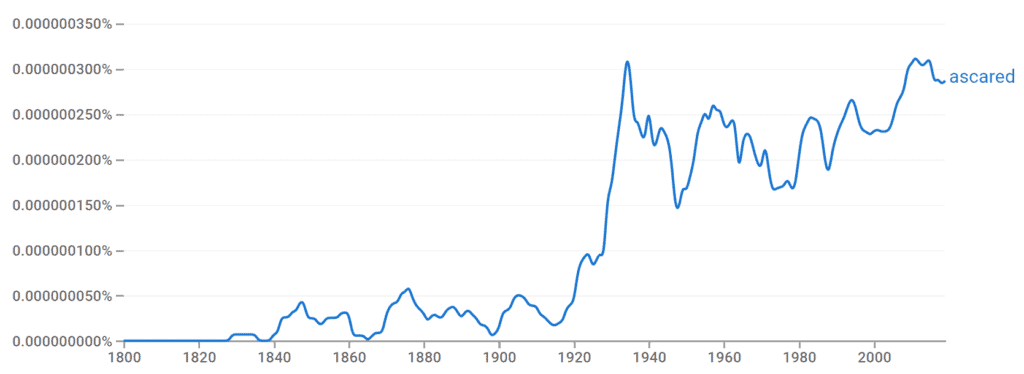If the English language wasn’t tricky enough, combining words to form new ones muddies the slope even further.
Ascared is one of those words that first appeared in American dialect around the turn of the 19th century. Its use surrounds the emotion of fear, and it is more likely to be used in speech than in writing despite being recognized by all major dictionaries.
Take a look at its use and meaning to understand how to use it in your speech and writing.
What Does Ascared Mean?

Ascared, sometimes spelled a-scared, is an American colloquialism (a word or phrase not formal or literary, typically used in ordinary or familiar conversation) formed by fusing the synonyms scared and afraid.
The word appears more often in speech than in writing and first appeared as part of local accent and dialect. In writing, it’s sometimes used mockingly, usually implying that the ascared person’s fear is childish, immature, or shortsighted.
Although ascared may be helpful in written dialogue, it would be considered out of place in formal or serious writing. It should be reserved for informal written communication and speech between family, friends, or close acquaintances.
Origin of Ascared

Ascared was first recorded in writing around 1905 as a combination of the words scared and afraid. A- was attached as a prefix to the past participle scared and was likely influenced by the British dialect version yscared that is recorded through the latter half of the 1800s.
As a regional word, it is often first attributed to the New Hampshire French-Canadian residents who later spread into the Midwestern rural farming areas. Today, the slang is often recognized as more heavily used in the South, likely spread through the movement of farming communities.
Examples of Ascared Used in Writing
Since the word is not commonly used and is attributed to regional dialect and informal wiring, it is not often seen. However, we have dug up a few instances of its use.
So, then the Arab League got ascared that Qaddafi would retaliate against them (originally found in a comment on a Wall Street Journal post).
It also appears in written dialogue in fictional works—for example:
“I wonder,” said Hopalong, glancing through the door, “if them friends of mine reckon I’m any ascared to go in that tent?” [Bar-20 Days, Clarence E. Mulford]
An’ somehow you’re glad you’re goin’, an’ you ain’t a-scared to die … [“The Little Old Log Cabin,” Robert W. Service]
Let’s Review
Ascared is an informal word that fuses together the words scared and afraid. It has roots in British slang and first appeared in the New Hampshire regions within the last half of the 1800s. Since then, it has become more common through the Midwest and Southern states and is used more in speech than in writing.
